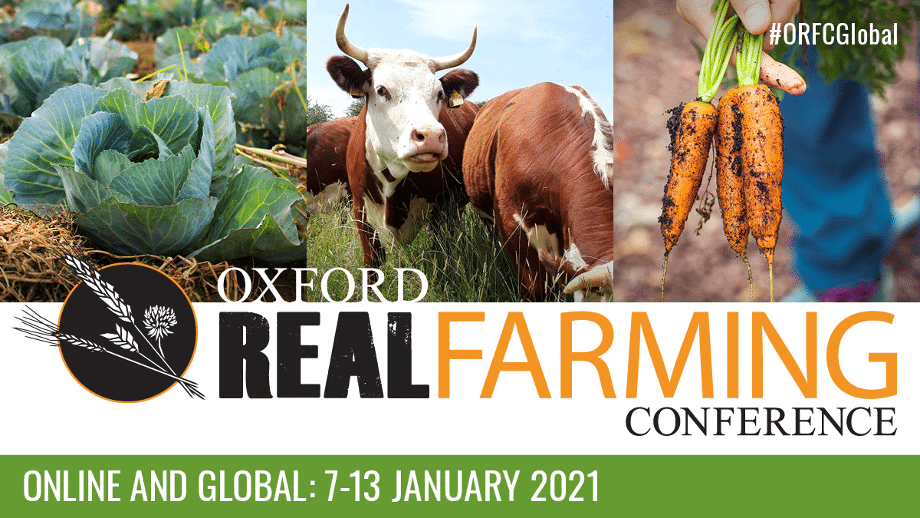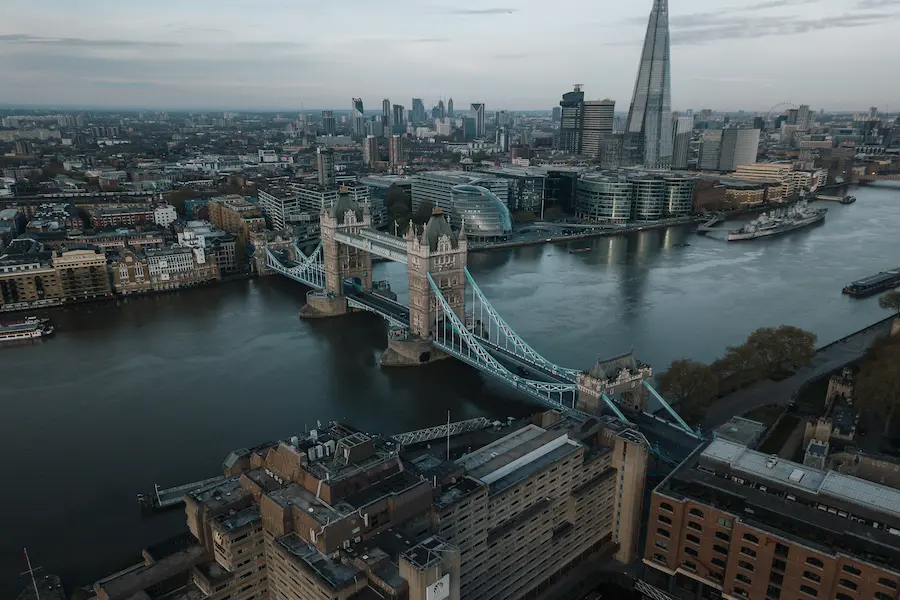Top 10 events at the Oxford Real Farming Conference 2021

The Oxford Real Farming Conference (ORFC) will host its biggest ever global online event between 7-13 January 2021, in an urgent bid to fix our broken food system.
Every January, the conference brings together thousands of farmers, growers, food producers, activists and policymakers in the biggest agroecology event to share practical advice and innovative farming approaches that can tackle some of the challenges we face.
Key themes at ORFC 2021 include:
- Resilience and the road to COP26
- The importance of healthy soil
- Resisting corporate take-overs of seed and food systems
- The value of indigenous knowledge
- Redressing racial inequity in our food system
- The future of UK farming
- Biodiversity loss and the impact on our health
With over 150+ hours of sessions, across 6 continents, over 7 days, there are plenty of radical, inclusive, practical and progressive talks to tune into. Here are our top events that you don’t want to miss:
Thursday, 7 January: 16:00 – 17:00
Farming for Change: Mapping a Route to 2030
Chair: Sue Pritchard
Speakers: Jo Lewis, Chris Howe, Xavier Poux, Ben Andrews
The Food, Farming Countryside Commission is launching new research looking at how future farming systems based on agroecological principles could be feasible for UK nations – removing the need for artificial inputs whilst producing healthy food to feed a growing population, contributing to net zero targets and making more space to restore nature.
In this session, the panellists will explore some of the details of this research and talk about the questions that it opens up for the future. The research builds on work, carried out by IDDRI at a European level, that was introduced by FFCC and Soil Association at the last Oxford Real Farming Conference.
Thursday, 7 January: 16:00 – 17:00
Food Justice not Food Aid
Chair: Dee Woods
Speakers: Aslesha Khadse, Stefanie Swanepeol, David Otieno
Access to fresh, affordable, nourishing, locally produced and culturally appropriate food should be the guaranteed right of every individual and household. However, global food systems are increasingly dominated by an ‘industrial diet’ where highly processed and low nutrient foods are widely available and most easily accessible.
In this Oxford Real Farming Conference session, organised by the Landworkers Alliance and La Via Campesina, an international panel discusses how the solutions to hunger need to be systemic and focused on meeting the needs of people rather than lining the pockets of corporations.
Friday, 8 January: 12:00 – 13:00
Chair: Helen Chesshire
Speakers: Martin Lines, Andrew Barbour, Craig Livingstone
Working towards Net Zero to reduce global warming has well and truly arrived for us all and is even more important now as we strive to reach Government targets. Farmers are key and incredibly well placed to help deliver this globally, through a range of changes and options for their farming practices.
This Oxford Real Farming Conference session on reaching Net Zero or even Sub-Zero by using nature-friendly solutions brings you practical ways to help achieve this on your farm.
Sunday, 10 January: 16:00 – 17:00
Chair: Suzy Russell
Speakers: Judith Hitchman, Tom O’Kane, Florent Sebban
Community Supported Agriculture (CSA) has played a critical role in feeding local communities during the COVID-19 crisis. The pandemic has highlighted the weaknesses and gaps in our global food production and distribution systems. In contrast, smaller more local farms and direct sales models are being celebrated as more resilient and veg box customer numbers soared in 2020.
Join this session to hear from CSA farmers in Europe and the global CSA movement Urgenci, about the different responses and approaches taken by CSAs throughout the pandemic.
Monday, 11 January: 20:00 – 21:00
Speakers: Merlin Sheldrake, Charles Foster
Thinking about fungi makes the world look different. Most fungi live out of sight yet make up a massively diverse kingdom of organisms that support and sustain nearly all living systems. Fungi throw our concepts of individuality and even intelligence into question. They can change our minds, heal our bodies, and help remediate environmental disaster.
In this Oxford Real Farming Conference conversation, Merlin Sheldrake and Charles Foster will discuss the ways these extraordinary organisms – and our relationships with them – change our understanding of the planet on which we live, and the ways that we think, feel, and behave.
Tuesday, 12 January: 20:00 – 21:00
Interest in soil health and its capacity to sequester carbon has risen dramatically in recent years. In some countries, farmers receive payments for soil carbon sequestration. However, uncertainties still exist in our understanding of soil carbon and the best ways to measure it.
Hear emerging findings from the UK Soil Carbon Project, alongside cutting-edge insight on our understanding of soil carbon and the best protocols for measuring it. With discussions on why this is increasingly relevant for farmers and the associated opportunities and challenges.
Wednesday, 13 January: 13:00 – 14:00
Chair: Liz Bowles
Speakers: Louise Luttikholt, Sarah Compson, Harry Farnsworth, Joshua Wickerham
What does it take to deliver meaningful impact on our food production systems? Why is certification important and what other tools are there that will help facilitate better and best practice? At the Oxford Real Farming Conference, we consider a range of approaches that aim to deliver lasting, positive change.
We know that agricultural practices are pivotal when it comes to mitigating the climate, nature and health crises we face, but debate rages about which ones are having meaningful impact. So how can we support farmers to develop farming systems that are a force for good, for all?
Wednesday, 13 January: 14:00 – 15:00
Chair: John Vidal
Speakers: Debal Deb, John Letts, Sir Bob Watson
Only a decade ago it was widely thought that tropical forests and intact natural environments threatened humans by harbouring the viruses and pathogens that lead to new diseases in humans like Ebola, HIV and dengue.
Today, a number of researchers think it is actually humanity’s destruction of biodiversity that creates the conditions for new viruses and diseases like COVID-19 to arise. In this session we look at how changes in farming practice – in particular growing monocultures at scale and an increasing reliance on corporate plant breeding at the expense of genetic diversity, have helped create the conditions for these new diseases to emerge. And we ask what can be done to protect us from future pandemics.
Wednesday, 13 January: 15:00 – 16:00
Chair: Vicki Hird
Speakers: Lynne Phillips, Adrian Steele, Rebecca Laughton
The new crop of farm support schemes – from Environmental Land Management scheme (ELMS) to productivity and animal health and welfare are all being finalised. The ELMS will be piloted in England in 2021 and so we will soon know what Defra will be paying for, who is eligible, how the payments and scheme will work on the ground, and how ‘whole farm’ the scheme will be.
Do they live up to what we need for an agro-ecological transition? If not, what can we do and how? At the Oxford Real Farming Conference, we will hear from DEFRA on the current state of play and from farming organisations about what is good, what may be still missing from the suite of measures and how we can influence the final schemes.
Wednesday, 13 January: 20:00 – 21:00
Chair: Jamie Hartzell
Speakers: Nnimmo Bassey, Naomi Klein
Do we even have a right to be hopeful? With political and ecological fires raging all around, is it irresponsible to imagine a future world radically better than our own? A world of healed ecosystems? Of food sovereignty and equal access to land? A world where governments fear the people instead of the other way around?
These are questions that Naomi Klein and Nnimmo Bassey wrestled with when they conceived of a sequel to last year’s Emmy-nominated short, “A Message From the Future with Alexandria Ocasio-Cortez.” The film touched a nerve and ended up being viewed more than 12 million times.
Join globally known activists, Naomi Klein and Nnimmo Bassey at the Oxford Real Farming Conference, as they show us the eight-minute sequel to Message from the Future, discuss the lessons we can learn from this extraordinary time and what a better and more hopeful future might look like.
Greenhouse PR works with organisations and leaders who are pioneering climate action. Whether it’s energy, food, fashion, finance or farming, if you’ve got a great story and need our help to tell it, get in touch with the Greenhouse team on 0117 214 1250 or email info@greenhousepr.co.uk.


